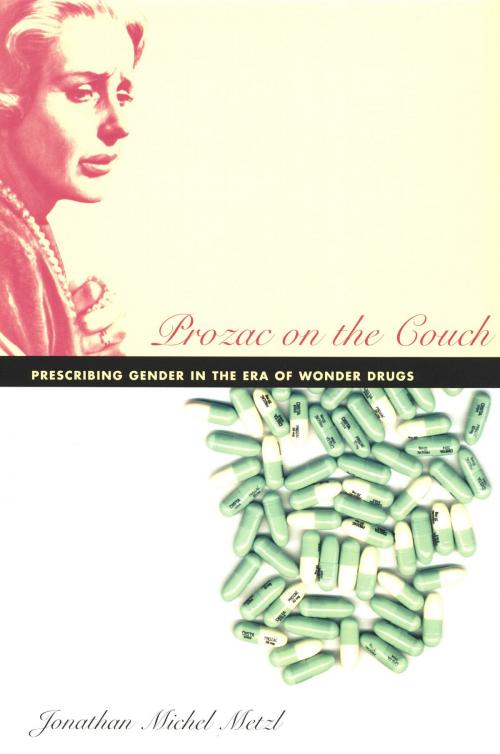Prozac on the Couch
Prescribing Gender in the Era of Wonder Drugs
Nonfiction, Health & Well Being, Medical, Specialties, Psychiatry| Author: | Jonathan Michel Metzl | ISBN: | 9780822386704 |
| Publisher: | Duke University Press | Publication: | April 16, 2003 |
| Imprint: | Duke University Press Books | Language: | English |
| Author: | Jonathan Michel Metzl |
| ISBN: | 9780822386704 |
| Publisher: | Duke University Press |
| Publication: | April 16, 2003 |
| Imprint: | Duke University Press Books |
| Language: | English |
Pills replaced the couch; neuroscience took the place of talk therapy; and as psychoanalysis faded from the scene, so did the castrating mothers and hysteric spinsters of Freudian theory. Or so the story goes. In Prozac on the Couch, psychiatrist Jonathan Michel Metzl boldly challenges recent psychiatric history, showing that there’s a lot of Dr. Freud encapsulated in late-twentieth-century psychotropic medications. Providing a cultural history of treatments for depression, anxiety, and other mental illnesses through a look at the professional and popular reception of three “wonder drugs”—Miltown, Valium, and Prozac—Metzl explains the surprising ways Freudian gender categories and popular gender roles have shaped understandings of these drugs.
Prozac on the Couch traces the notion of “pills for everyday worries” from the 1950s to the early twenty-first century, through psychiatric and medical journals, popular magazine articles, pharmaceutical advertisements, and popular autobiographical "Prozac narratives.” Metzl shows how clinical and popular talk about these medications often reproduces all the cultural and social baggage associated with psychoanalytic paradigms—whether in a 1956 Cosmopolitan article about research into tranquilizers to “cure” frigid women; a 1970s American Journal of Psychiatry ad introducing Jan, a lesbian who “needs” Valium to find a man; or Peter Kramer’s description of how his patient “Mrs. Prozac” meets her husband after beginning treatment.
Prozac on the Couch locates the origins of psychiatry’s “biological revolution” not in the Valiumania of the 1970s but in American popular culture of the 1950s. It was in the 1950s, Metzl points out, that traditional psychoanalysis had the most sway over the American imagination. As the number of Miltown prescriptions soared (reaching 35 million, or nearly one per second, in 1957), advertisements featuring uncertain brides and unfaithful wives miraculously cured by the “new” psychiatric medicines filled popular magazines. Metzl writes without nostalgia for the bygone days of Freudian psychoanalysis and without contempt for psychotropic drugs, which he himself regularly prescribes to his patients. What he urges is an increased self-awareness within the psychiatric community of the ways that Freudian ideas about gender are entangled in Prozac and each new generation of wonder drugs. He encourages, too, an understanding of how ideas about psychotropic medications have suffused popular culture and profoundly altered the relationship between doctors and patients.
Pills replaced the couch; neuroscience took the place of talk therapy; and as psychoanalysis faded from the scene, so did the castrating mothers and hysteric spinsters of Freudian theory. Or so the story goes. In Prozac on the Couch, psychiatrist Jonathan Michel Metzl boldly challenges recent psychiatric history, showing that there’s a lot of Dr. Freud encapsulated in late-twentieth-century psychotropic medications. Providing a cultural history of treatments for depression, anxiety, and other mental illnesses through a look at the professional and popular reception of three “wonder drugs”—Miltown, Valium, and Prozac—Metzl explains the surprising ways Freudian gender categories and popular gender roles have shaped understandings of these drugs.
Prozac on the Couch traces the notion of “pills for everyday worries” from the 1950s to the early twenty-first century, through psychiatric and medical journals, popular magazine articles, pharmaceutical advertisements, and popular autobiographical "Prozac narratives.” Metzl shows how clinical and popular talk about these medications often reproduces all the cultural and social baggage associated with psychoanalytic paradigms—whether in a 1956 Cosmopolitan article about research into tranquilizers to “cure” frigid women; a 1970s American Journal of Psychiatry ad introducing Jan, a lesbian who “needs” Valium to find a man; or Peter Kramer’s description of how his patient “Mrs. Prozac” meets her husband after beginning treatment.
Prozac on the Couch locates the origins of psychiatry’s “biological revolution” not in the Valiumania of the 1970s but in American popular culture of the 1950s. It was in the 1950s, Metzl points out, that traditional psychoanalysis had the most sway over the American imagination. As the number of Miltown prescriptions soared (reaching 35 million, or nearly one per second, in 1957), advertisements featuring uncertain brides and unfaithful wives miraculously cured by the “new” psychiatric medicines filled popular magazines. Metzl writes without nostalgia for the bygone days of Freudian psychoanalysis and without contempt for psychotropic drugs, which he himself regularly prescribes to his patients. What he urges is an increased self-awareness within the psychiatric community of the ways that Freudian ideas about gender are entangled in Prozac and each new generation of wonder drugs. He encourages, too, an understanding of how ideas about psychotropic medications have suffused popular culture and profoundly altered the relationship between doctors and patients.















